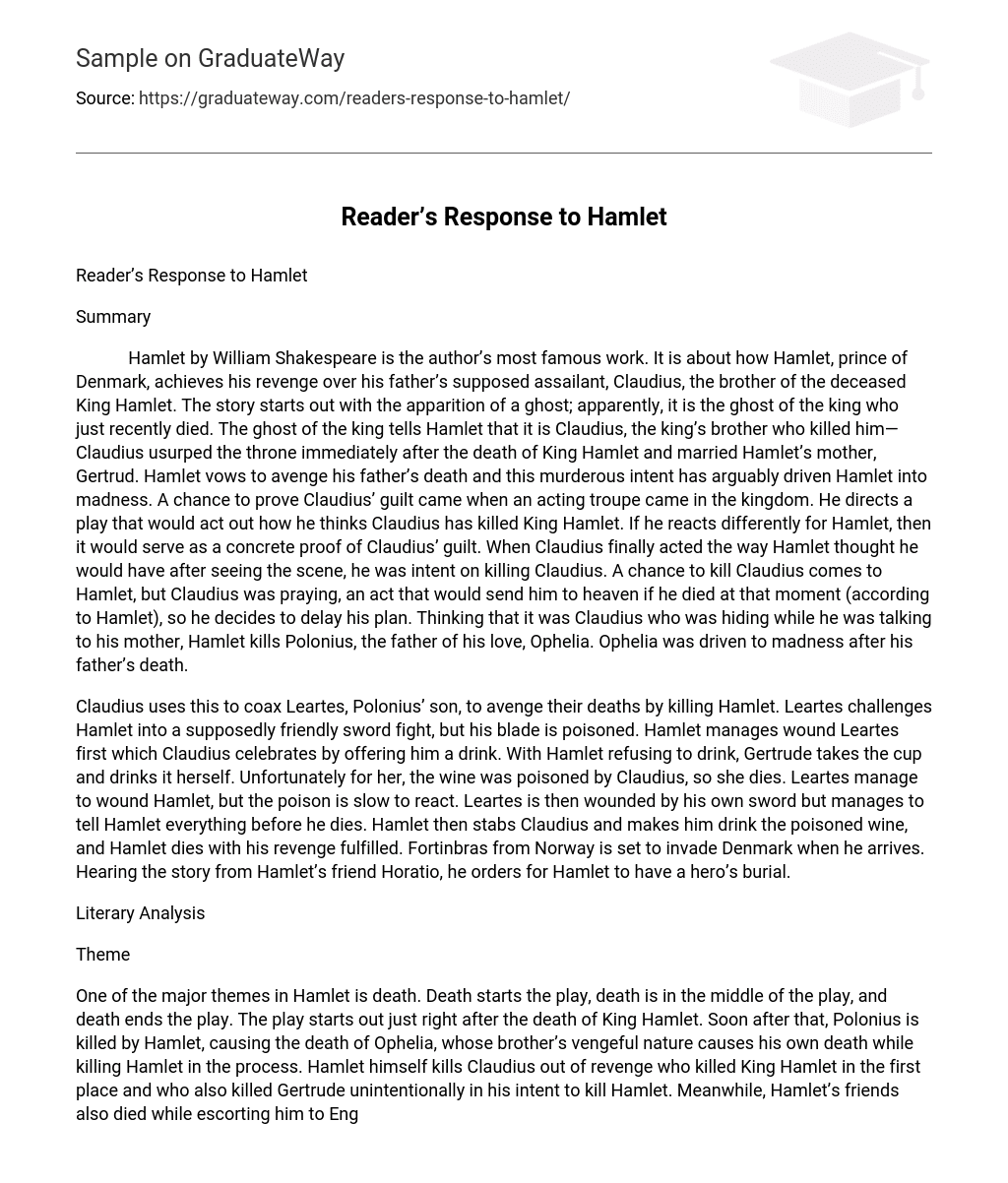Summary
Hamlet by William Shakespeare is the author’s most famous work. It is about how Hamlet, prince of Denmark, achieves his revenge over his father’s supposed assailant, Claudius, the brother of the deceased King Hamlet. The story starts out with the apparition of a ghost; apparently, it is the ghost of the king who just recently died. The ghost of the king tells Hamlet that it is Claudius, the king’s brother who killed him—Claudius usurped the throne immediately after the death of King Hamlet and married Hamlet’s mother, Gertrud. Hamlet vows to avenge his father’s death and this murderous intent has arguably driven Hamlet into madness. A chance to prove Claudius’ guilt came when an acting troupe came in the kingdom. He directs a play that would act out how he thinks Claudius has killed King Hamlet. If he reacts differently for Hamlet, then it would serve as a concrete proof of Claudius’ guilt. When Claudius finally acted the way Hamlet thought he would have after seeing the scene, he was intent on killing Claudius. A chance to kill Claudius comes to Hamlet, but Claudius was praying, an act that would send him to heaven if he died at that moment (according to Hamlet), so he decides to delay his plan. Thinking that it was Claudius who was hiding while he was talking to his mother, Hamlet kills Polonius, the father of his love, Ophelia. Ophelia was driven to madness after his father’s death.
Claudius uses this to coax Leartes, Polonius’ son, to avenge their deaths by killing Hamlet. Leartes challenges Hamlet into a supposedly friendly sword fight, but his blade is poisoned. Hamlet manages wound Leartes first which Claudius celebrates by offering him a drink. With Hamlet refusing to drink, Gertrude takes the cup and drinks it herself. Unfortunately for her, the wine was poisoned by Claudius, so she dies. Leartes manage to wound Hamlet, but the poison is slow to react. Leartes is then wounded by his own sword but manages to tell Hamlet everything before he dies. Hamlet then stabs Claudius and makes him drink the poisoned wine, and Hamlet dies with his revenge fulfilled. Fortinbras from Norway is set to invade Denmark when he arrives. Hearing the story from Hamlet’s friend Horatio, he orders for Hamlet to have a hero’s burial.
Literary Analysis
Theme
One of the major themes in Hamlet is death. Death starts the play, death is in the middle of the play, and death ends the play. The play starts out just right after the death of King Hamlet. Soon after that, Polonius is killed by Hamlet, causing the death of Ophelia, whose brother’s vengeful nature causes his own death while killing Hamlet in the process. Hamlet himself kills Claudius out of revenge who killed King Hamlet in the first place and who also killed Gertrude unintentionally in his intent to kill Hamlet. Meanwhile, Hamlet’s friends also died while escorting him to England where he is supposedly to be executed. Hence, death is everywhere in Hamlet. By including a lot of deaths, the play suggests that it is a natural thing to occur and it is part of human life, although none of the characters actually die from a natural cause.
Characters
Hamlet is the prince of Denmark. He is the son of King Hamlet and Queen Gertrude. He contemplates a lot—so much so that critics interpret him as mad.
Gertrude is the mother of Hamlet and wife of King Hamlet and eventually Claudius. Her immediate marriage to Claudius makes her character doubtful and brings hints to her guilt on a probable hand on the murder of her husband.
Leartes is the son of Polonius and brother of Ophelia. He was away at the death of his sister and father, and upon his return, he develops the same vengeful mentality that Hamlet had when he has learned of his father’s murder.
Claudius is the brother of King Hamlet. He usurped his brother after apparently killing him. He marries right away the widowed Queen Gertrude. He is manipulative, as proven by his murder of his own brother to attain power.
Quotes and Comments
“To be or not to be: that is the question” (3.1.58). This is most famous line in the play and probably the most famous line of all of Shakespeare’s plays, and I dare say that is the most famous line in literature. While is it the most famous line of the play, few people actually understand it. The line is just too popular that even if people have not read the play they know t came from Shakespeare. This line is delivered by Hamlet when he is contemplating about the subject of death—to die or not.
“Frailty thy name is woman!” (1.2.146). A lot of feminist would raise a brow over this line delivered by Hamlet because it appears Hamlet has committed the fallacy of generalization. However, this line actually explains Hamlet’s disgust over his mother for marrying Claudius almost immediately right after the death of King Hamlet.
“I will speak daggers towards her but use none” (3.2.358). This line shows how Shakespeare has mastered the art of words play. Speaking in daggers brings about “gory” images of Hamlet lashing out hurtful words towards his mother, but since he will use none, Shakespeare used a paradox to show that Hamlet only speaks harshly towards her mother only in his mind and does not actually say hurtful words to Gertrude.
Works Cited
Shakespeare, William. Hamlet. London: Sampson Low, Son and Co.,1604.





